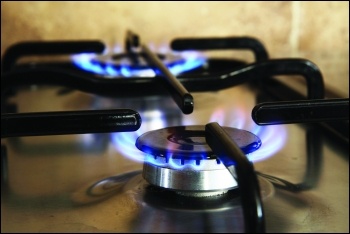Energy price crisis: nationalise energy giants to save us from £600 hit
James Collett, Gloucestershire Socialist Party
The energy price cap, set to be announced on 7 February and come into effect from April, is expected to increase by over 50%. This would mean a further £600 a year to be paid by the average UK household, at a time when many are already at breaking point due to inflation and low wages.
Financial expert Martin Lewis tweeted that he was left “shaking and tearful” after witnessing the cruel reality of the energy crisis, “to be unable to help a single mum who lost her partner in Covid afford her energy bills leaves me feeling impotent”. No amount of clever switching of suppliers will save us from this price hit.
Meanwhile, as the energy cost crisis deepened, oil company Shell replaced AstraZeneca at the top of the FTSE100 index, reaching a market capitalisation of £133 billion. The same revolting pattern of inequality is to be seen everywhere: the super-rich minority at the top rake in more and more profits while their system delivers nothing but misery for the rest of us.
Divisions in parliament and the cabinet show that the ruling class can already feel the hot breath of the working class on their necks. Even right-winger Jacob Rees-Mogg reportedly argued against the National Insurance rise in a cabinet meeting, fearful of the anger which is palpably growing in society.
At the moment, a limited £140 one-off discount on energy bills as part of the ‘Warm Homes Discount Scheme’ is available, but only for those who meet specific criteria for being on a low income.
As it stands, households pay 5% VAT on energy bills. Britain’s 27.8 million households paying an extra £600 each would generate an extra £834 million for the Treasury – straight out of ordinary people’s pockets. No doubt chancellor Rishi Sunak has pound signs in his eyes. And no wonder the Tories are at this stage rejecting calling to scrap this tax on energy.
Investment in better insulation for homes could, according to research, save £500 a year on average household energy bills, a necessary investment for fuel bills and the environment. But predictably, the Tory government’s most recent home insulation initiative, the Green Homes Grant, was scrapped after just six months.
Labour has called for a one-off ‘windfall tax’ on oil and gas company profits. But this doesn’t go far enough.
It is necessary to fight for all measures to defend households from the energy price hit. This includes opposing flat-rate taxes that hit the poor hardest like VAT, ensuring that benefits and other subsidies are at a level where all can afford to live in well-heated homes, and measures to make sure the big profiteering and polluting companies pay.
But none of this tackles the real issue. The energy price cap is being raised to save privatised energy companies. Ordinary households are being asked to pay the bill for a failure of the market.
Under capitalism, the energy industry is run for profit and consequently can never meet the needs of consumers, workers, or the environment.
The only way to ensure affordable energy prices, and the only way to transition swiftly to green energy, is to take these companies into public ownership as part of a democratic socialist plan of production. The big investors, who are currently rubbing their hands together at the prospect of even higher energy prices, should be treated like the parasites they are: they contribute nothing to society and should receive nothing in the way of compensation.
Chancellor Rishi ‘super-rich’ Sunak says he “understands people’s anxiety… about rising prices” – but there is only one language that he and the rest of the capitalist class will understand: the language of struggle. A determined working-class movement, given a firm lead by the trade unions, is what’s needed – not only to push back this weak and divided government, but to demand the full nationalisation of the fossil fuel and energy companies.








